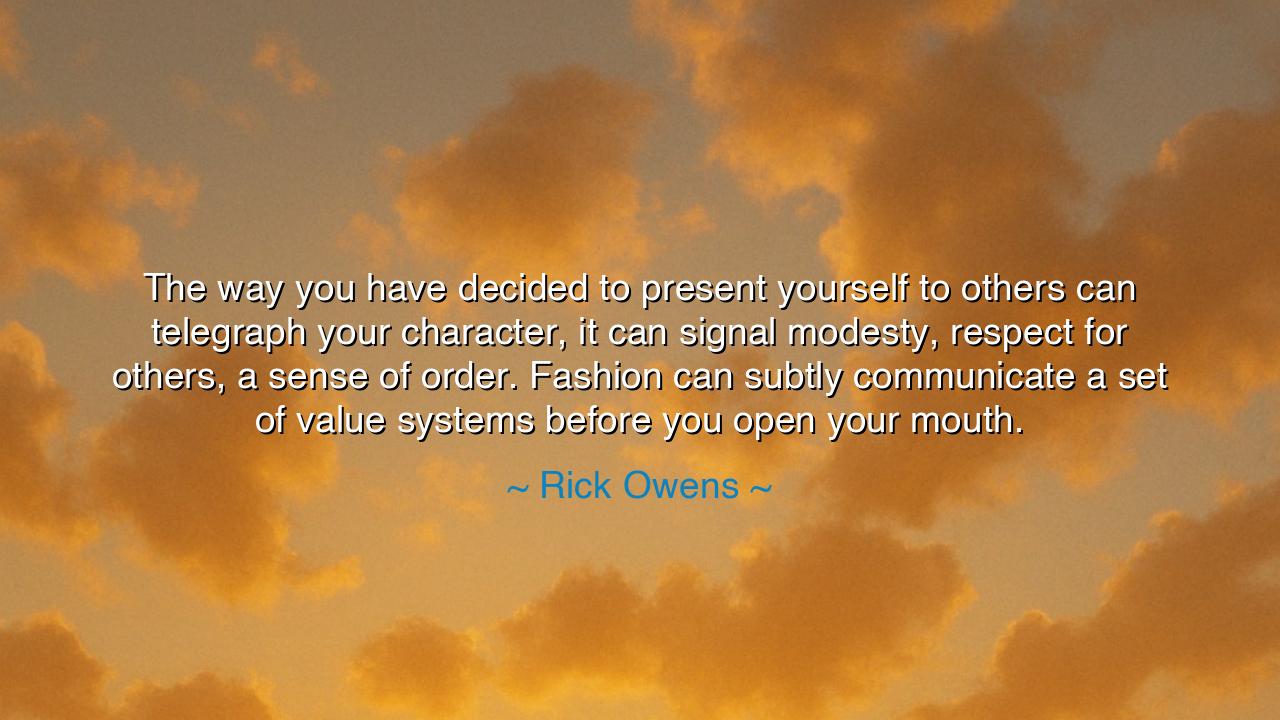
The way you have decided to present yourself to others can
The way you have decided to present yourself to others can telegraph your character, it can signal modesty, respect for others, a sense of order. Fashion can subtly communicate a set of value systems before you open your mouth.






Hear, O seekers of wisdom, the words of Rick Owens, a craftsman of garments and philosopher of form, who declared: “The way you have decided to present yourself to others can telegraph your character, it can signal modesty, respect for others, a sense of order. Fashion can subtly communicate a set of value systems before you open your mouth.” Though spoken in the realm of cloth and style, these words rise beyond fabric and thread. They speak to the ancient truth that appearance is not vanity alone, but the first message a soul sends into the world.
The origin of this saying lies in the eternal dialogue between inner being and outward sign. From the earliest days, mankind has clothed itself not only for protection, but for meaning. Robes of kings bore the weight of sovereignty; the plain garb of monks spoke of humility; the armor of warriors declared their readiness for sacrifice. Thus, fashion has always been more than adornment—it is a language, a symbol, a proclamation of one’s place, one’s dignity, one’s values. Owens reminds us that before our lips move, our garments speak, telling others who we are and how we regard the world.
Consider the power of such presentation in history. When Mahatma Gandhi came before kings and empires clad only in his simple homespun cloth, it was no accident. His garment was a message: that his values lay not in jewels or crowns, but in solidarity with the poorest of his people. The world heard him before he spoke a word. His attire telegraphed his character—modesty, discipline, and resistance to oppression—and it moved millions. So too, the clothing of Martin Luther King Jr., simple yet dignified, declared that his struggle for justice was not lawless rebellion, but a demand for respect and order.
Yet, Owens does not speak only of heroes. His words reach into the lives of all. For each day we rise and choose how we appear before others, we decide what message we send. A careless appearance may proclaim indifference, or even disrespect, while a thoughtful one can radiate respect for others and harmony with community. This is not about wealth or grandeur, but about intention. A clean garment, a modest presentation, a sense of balance—these whisper of inner discipline and regard for the dignity of those around us.
There is also warning in his words. To scorn fashion as meaningless is to neglect the language that others cannot help but read. A soul may be noble within, but if it presents itself with arrogance or disorder, others will turn away before listening. Just as a diplomat chooses words with care, so must a person choose their outward form, lest their true self be misunderstood. In this way, Owens recalls the wisdom of the ancients: appearance is not the essence of virtue, but it is the gate through which virtue may enter another’s heart.
So what lesson shall we take? It is this: live with awareness of what you communicate, even in silence. Let your outward self mirror the inward truth you hold dear. If you value modesty, let it show in restraint. If you honor community, let it show in neatness and respect. If you cherish order, let it shine in the balance of how you carry yourself. Do not adorn yourself with vanity, but with meaning. For in doing so, you make of your life a message that uplifts rather than confuses, that invites rather than repels.
Therefore, O listeners, let your daily actions be clear. Choose your garments not for vanity, but for purpose. Ask yourself before you step forth: “What do I say before I speak?” Align your fashion with your values, so that your very presence becomes a blessing, a sign of harmony, a quiet teaching to those who see you. For the truth is this: every thread can carry wisdom, and every choice of appearance can echo eternity.
Thus remember Owens’ counsel: fashion is not empty—it is a language. And when spoken with care, it can tell the world of your respect, your modesty, and your order long before your tongue utters a single word.






AAdministratorAdministrator
Welcome, honored guests. Please leave a comment, we will respond soon